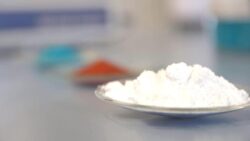Lithium has become a vital component for the batteries that power electric cars. But with neither mines nor refineries on its soil, can Europe break its dependence on foreign imports? The Down to Earth team takes a closer look.
A strategic resource
The days of petrol and diesel cars are numbered. In the EU, their sale will be banned as of 2035. That means electric cars will become the norm. They run on lithium batteries, each containing about 10 kilos of the metal. To keep up with this rising demand, global production will need to increase 40-fold in 20 years. Currently, four countries have a near-monopoly on lithium extraction: Australia, Chile, China and Argentina. But Europe wants its share of the booming market. The continent is sitting on lithium deposits but these have never been properly exploited, until now.
France’s first lithium mine
France has joined the white gold rush. The country’s first lithium mine is set to open in the Allier department in 2028. Large deposits of the precious mineral were discovered by French mining giant Imerys in its existing clay mine. The company now hopes to produce 34,000 tonnes of lithium, enough to power 700,000 electric vehicles.
“We’ve designed a mine, fully underground,” says Alan Parte, Vice President of lithium projects at Imerys. “Why would we do that? To limit the mine’s impact on the natural environment above, to limit the noise, dust clouds and any consequences on biodiversity.”
The acceptability of mines
In Serbia, a similar project fell through because of local opposition. Acceptability could turn out to be a major challenge for the industry. Many people see mines as remnants of an industrial past, and a scar on the landscape.
Locals near France’s future lithium mine have also raised their concerns. Xavier Thabarant belongs to a local association advocating for the protection of the forest bordering the mining project. He explains why he and a group of other residents are campaigning against the mine project: “We’ll have this mine for 20-25 years, maybe 30 years, who knows, to mine lithium we’ll use to make some batteries. Then, in 50 years we’ll run out of lithium. And there’ll be nothing left here but destruction.”
As the group sees it, the shift to green technology shouldn’t come at all costs.
“I do realise that we need new sources of energy,” Thabarant says. “But I think there are other solutions out there. Going fully electric is a mistake, it’s a utopia. It’s short-sighted.”
Batteries, made in Europe
In its bid to achieve greater autonomy, Europe will not only need to mine lithium. Manufacturing batteries will also be paramount. For the moment, though, the continent lacks the know-how to compete with the world’s leading manufacturers. Automotive Cells Company (ACC) is Europe’s answer to this strategic conundrum: an alliance between giants TotalEnergies, Stellantis and Mercedes.
The company plans to open three gigafactories in France by the end of 2023 and is currently testing its technology in a pilot factory.
“Our goal is to become a leading manufacturer of electric car batteries in Europe,” says Matthieu Hubert, ACC’s Director of Public Affairs. “Now, we need to catch up on lost time, but we have what it takes to pull it off.”
Life after lithium?
Lithium doesn’t actually fall into the rare metal category, but that doesn’t mean supplies are endless. According to some estimates, the world could run out of lithium by the end of the century. Researchers have already begun to imagine a post-lithium world.
In Amiens, northern France, Mathieu Morcrette and a team of engineers at the Energy Hub lab have created a battery without lithium, using sodium-ion technology instead. Sodium-ion could in fact be the perfect replacement for lithium, mainly because it’s abundant on Earth. Its potential for generating energy, however, is limited and sodium batteries won’t be able to compete with their lithium counterparts.
“You could make a comparison with athletics,” Morcrette explains. “Lithium-ion is a marathon runner who can cover long distances, whereas sodium-ion batteries are more like sprinters who can cover short distances at very high speed.”
In other words, the range offered by sodium batteries will never equal that of lithium batteries. On the plus side, they recharge quickly, making them the ideal candidates for short trips and last-mile delivery. Ultimately, making the switch to sodium-ion will require a change of mentality, Morcrette says.
“If people insist on having electric cars with a range of 500 kilometres, we’re not going to make it,” he adds. “It means having to recharge more often when we’re on vacation. How bad can it be?”





